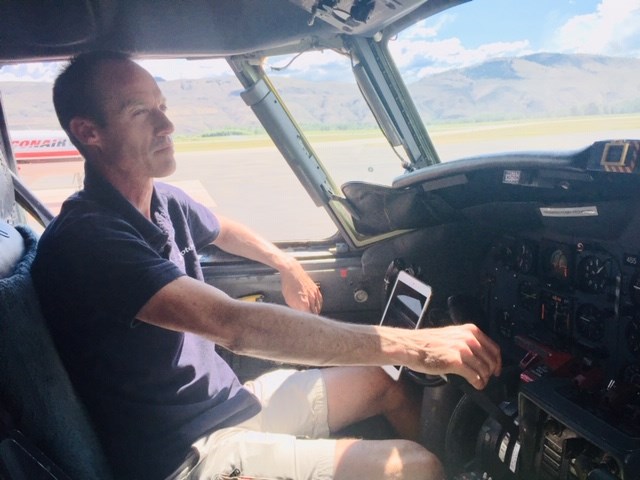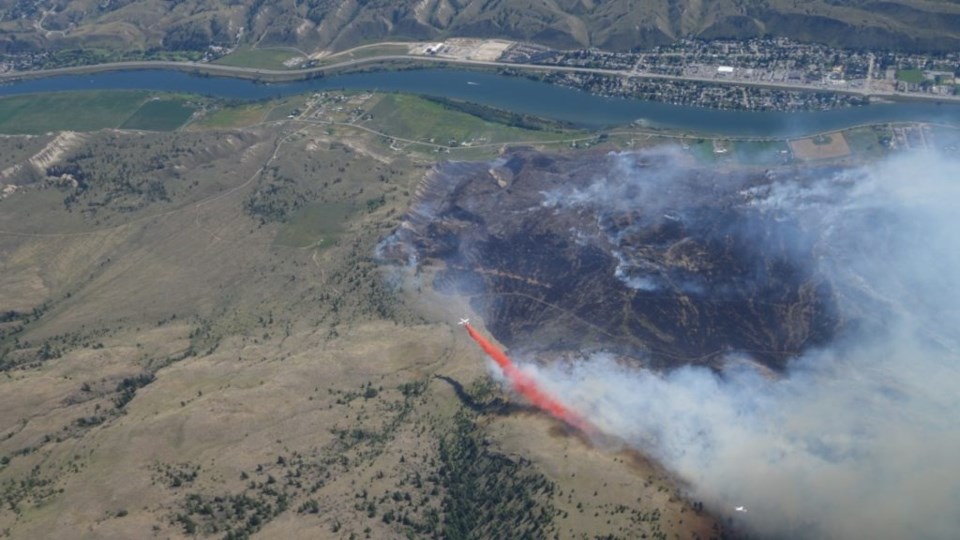“You are clear for the run.”
The official radio communication from B.C. Wildfire Service “Bird Dog” air attack Officer Vlad Lamoureux, giving air tanker pilot Anthony Ussher the go ahead to commence a bombing run on a fast-moving interface wildfire, next to the Sun Rivers golf resort community in Kamloops.
It was a hot and dry July 12, 2018. Nearby residents watched in awe as the Wildfire Service put on an air show that would ultimately save dozens of homes and win widespread praise for preventing what could have been a catastrophe.
“Experience is the name we give to our mistakes,” quips Lamoureux while stressing that safety is paramount in everything the air tanker division does.

His job isn’t for the faint of heart, as the Bird Dog often faces extreme turbulence, steep climbs and sudden maneuvers while deciding whether conditions are safe enough for a much larger Convair 580, carrying up to 2,000 gallons of fire retardant.
“My role is to secure the airspace so it’s safe to go low level. We will then do a show-me or dummy run, explaining what tactics we are hoping to accomplish with the tanker run,” says Lamoureux.
While admitting that his job as an air attack officer is exhilarating, Lamoureux also laments that it comes with a high level of stress – which over the years, has led to a degree of post-traumatic stress disorder (PTSD).
“Whenever homes are in danger or get burned, it has a different impact on you,” says Lamoureux, who notes that in the aftermath of some missions, he’s had trouble sleeping, wondering whether they could have somehow had a better outcome.
For Ussher, into his 15th season of firefighting in B.C., the dangerous aspect of his job is a matter of risk management:
“There’s no room for cowboys here,” he says with absolute certainty, while suggesting wildfire pilots face even stricter regulations than commercial aircraft.
“You’ve got to be calculated in this job,” he adds, reflecting on the death of his father, Donald Ussher, who was killed in an air tanker crash in South Africa 11 years ago. Despite the loss of his dad, Ussher says has never considered finding a new career:
“You don’t just pack up and go home…otherwise there would be nobody flying.”
While explaining the strategy behind aerial firefighting, Ussher says while descending toward a blaze, he turns off all radios except his direct communication with the Bird Dog.
“Once I contact the Bird Dog, he has my undivided attention – because what he is about to say is extremely important to get the job done safely and efficiently.”
A pilot for 26 years, Ussher is keenly aware of nearly all aspects of aerial firefighting.
“I flew Bird Dog for seven years which really helps because I know what’s going on in that plane down there,” says Ussher, noting that unlike a bomber pilot, the Bird Dog crew typically will have several radio communications on the go, including near constant contact with the provincial fire centre and other tanker aircraft.

With eight air tanker groups comprising eight Bird Dog aircraft, four 802 Fire Boss skimmers, four 802 Air Tractors, four L188 Electras and four Convair CV580 bombers, the B.C. Wildfire Service is well equipped to handle virtually any emergency. And according to Ussher, B.C. deserves to be commended for respecting taxpayers. Having fought wildfires in the U.S., Australia and New Zealand, he describes the B.C. Wildfire Service as “very organized” with a “surgical approach” of doing business in order to spend tax dollars wisely.
“From my experience, B.C. is likely the most responsible when it comes to controlling costs, unlike some places around the world where they will fight a fire constantly all day long until the last smoldering ember is extinguished.”
But while Ussher and Lamoureux are aware of the public’s admiration for provincial air tanker teams, they downplay their overall role in B.C.’s annual wildfire battles:
“We are there to support the hard-working ground crews, and it’s the sole job that we have.”
That said, few will argue that those magnificent men (and women) in their flying machines are critical to help keep B.C. communities safe from the ever-present threat of wildfires.
As always, I welcome your comments and criticism on Twitter @kammornanchor and email [email protected].
Bob Price is a veteran B.C. broadcaster who anchored the morning news on CHNL radio in Kamloops for the past 30 years. Bob is also a past Webster Award winner whose previous stops included Vancouver and Calgary.


